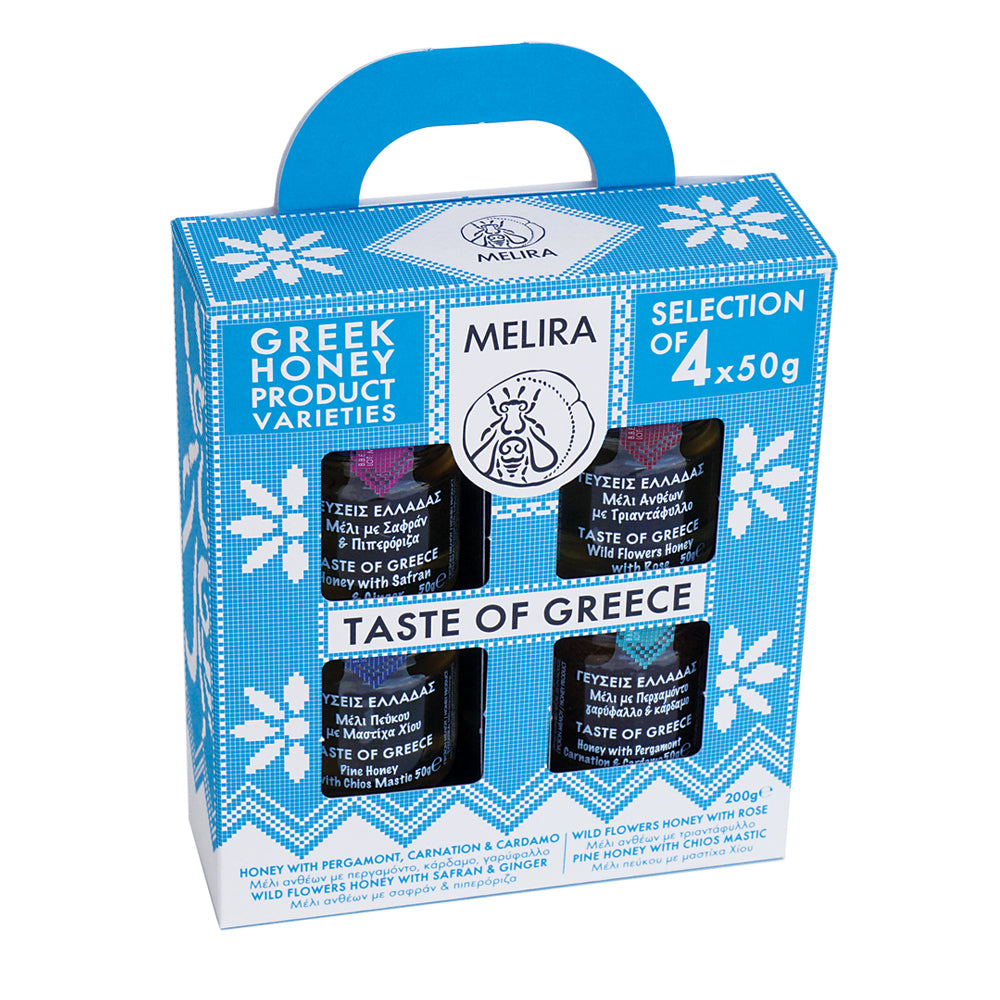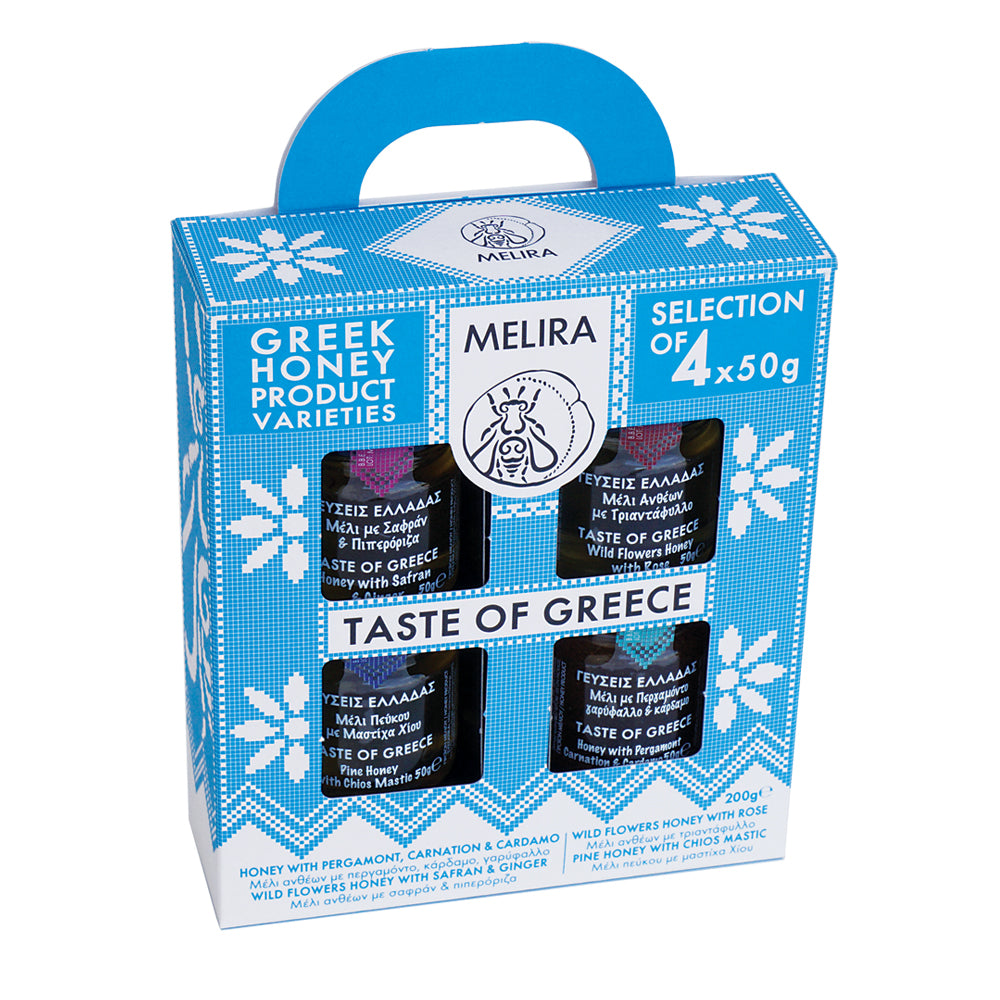Taste of Greece Special Gift Pack 4x1.8 oz | Assorted Premium Greek Honey Sampler
Taste of Greece Special Gift Pack 4x1.8 oz | Assorted Premium Greek Honey Sampler
Couldn't load pickup availability
- Great Gift
- Taste of Greece
- A Unique Collection
1x1.8 oz Greek Wild Flower Honey with Bergamot Flavoring:
- This is a 1.8-ounce (approximately 51 grams) jar of Greek wildflower honey that has been infused with the flavor of bergamot.
- Greek wildflower honey is typically a multi-floral honey derived from various nectar sources found in Greece.
- Bergamot is a fragrant citrus fruit, and its flavor is often used to add a unique citrusy and floral note to foods and beverages. In this case, it has been added to honey, potentially creating a sweet and aromatic combination.
1x1.8 oz Greek Wild Flower Honey with Rose Flavoring:
- Similar to the previous item, this is a 1.8-ounce jar of Greek wildflower honey, but it's infused with the flavor of roses.
- Rose flavoring imparts a floral and slightly sweet taste to the honey. It's often used in culinary applications to add a distinct and romantic floral note to dishes.
1x1.8 oz Thasos Pine Honey with Mastic Oil:
- Thasos Pine Honey is likely a type of honey produced on the Greek island of Thasos, known for its distinctive pine honey.
- Mastic oil is derived from the resin of mastic trees, which are primarily found on the Greek island of Chios. Mastic oil has a unique and slightly piney, resinous flavor.
- This product seems to combine Thasos Pine Honey with mastic oil, creating a unique blend that could have a rich, pine-flavored sweetness with a hint of resin.
1x1.8 oz Greek Wild Flower Honey with Saffron (Safran):
- This is another 1.8-ounce jar of Greek wildflower honey, but this time it's infused with saffron (known as "Safran" in some languages).
- Saffron is one of the world's most precious and aromatic spices, often used to impart a distinct floral and slightly earthy flavor to dishes.
- In this product, saffron is added to the honey, likely creating a unique and luxurious flavor profile.
These products are examples of flavored honey, where natural flavorings are added to honey to create unique and distinct taste experiences. They can be used in various culinary applications, such as drizzling over desserts, adding to tea, or even as a flavoring agent in cooking and baking. The choice of flavors can significantly impact the taste and aroma of the honey, making them popular among food enthusiasts and those seeking premium honey products.
Product Details
Product Details
Each recyclable glass jar contains 1.8 oz / 50 grams of honey.
As a natural product, pure honey may crystallize over time. To restore it to its liquid form, simply warm the jar in a bowl of warm water.
Do not feed honey to babies under one year of age.
1x1.8 oz Greek Wild Flower Honey with, Bergamot flavoring
1x1.8 oz Greek Wild Flower Honey with Rose Flavoring
1x1.8 oz Thasos Pine Honey with mastic oil
1x1.8 oz Greek Wild Flower Honey with Safran
Farm Information
Farm Information
Greece is known for its rich tradition of beekeeping and honey production. Greek honey is highly regarded for its quality and diversity, and it's influenced by the country's unique climate, landscape, and vegetation. Here's more information about the regions and factors that contribute to Greek honey production:
Geographical Diversity: Greece's diverse geography plays a significant role in honey production. The country's terrain includes mountains, valleys, islands, and coastal areas, each with its own distinct flora. This diversity in vegetation provides bees with access to a wide range of nectar sources, resulting in a variety of honey types, from wildflower honey to more specific varieties like thyme, pine, and heather honey.
Island Honey: Greece is composed of numerous islands, each with its own microclimates and plant varieties. Some islands are particularly well-known for their honey production. For example, Thasos, an island in the northern Aegean Sea, is famous for its Thasos Pine Honey, which is gathered from pine trees on the island. Other islands like Chios are renowned for their mastic production, which is used in honey and other culinary applications.
Mediterranean Climate: Greece enjoys a Mediterranean climate with mild, wet winters and hot, dry summers. This climate is conducive to the growth of a wide range of plants, herbs, and wildflowers, which provide nectar for bees. The Mediterranean climate is one of the reasons Greek honey is considered high in quality and flavor.
Traditional Beekeeping: Beekeeping has been practiced in Greece for centuries, and it remains an important part of the country's agricultural heritage. Many beekeepers in Greece follow traditional, sustainable methods of honey production. They often move their beehives to different locations throughout the year to take advantage of various flowering plants.
Unique Flavors: Greek honey is known for its unique and distinct flavors. For example, thyme honey, gathered from the blossoms of thyme plants, has a strong, herbal flavor. Pine honey, as mentioned, is harvested from the resinous pine trees and carries a distinct piney aroma. Wildflower honey, like the one mentioned in the original question, is a multi-floral honey that captures the essence of the varied plants in the region.
Cultural Significance: Honey holds cultural and historical significance in Greece. It is often associated with Greek mythology, and it's used in various traditional dishes and sweets. It's also considered a symbol of hospitality.
Overall, Greece's natural beauty, biodiversity, and the dedication of its beekeepers contribute to the production of a wide variety of high-quality honey products that are enjoyed both locally and globally. Greek honey is often sought after for its unique taste and the regional character it imparts to culinary creations.
Nutrition Facts
Nutrition Facts
Greek Wild Flower Honey 98%, Carnation 0,5%, cardamom 0.3%, cinnamon, nutmeg, Bergamot flavoring material 0,001%
Greek Wild Flower Honey 99,99%, Rose Flavoring material 0,01%
Thasos Pine Honey 99,97%, mastic oil - mastic water 0,03%
Greek Wild Flower Honey 99,95%, Safran 0,02%, Ginger 0,03%
Awards
Awards
- Great Taste 2018 Award
- Great Taste 2019 Award
- Superior Taste 2016 Award
Pairs Well With
Pairs Well With
These flavored honey products can pair well with a variety of foods and beverages, enhancing their flavors and creating delightful combinations. Here are some suggestions for pairings:
Greek Wild Flower Honey with Bergamot Flavoring:
Pair with black or green tea to complement the citrusy notes.
Drizzle over yogurt or mixed with Greek yogurt for a sweet and aromatic twist.
Use as a glaze for poultry or seafood dishes to add a touch of citrusy sweetness.
Greek Wild Flower Honey with Rose Flavoring:
Enjoy with soft, mild cheeses like brie or goat cheese.
Drizzle over fresh fruit salads for an elegant touch.
Add to a cup of herbal tea to create a soothing and fragrant beverage.
Thasos Pine Honey with Mastic Oil:
Serve with a cheese platter, particularly hard and salty cheeses.
Use as a sweetener for Greek desserts, like baklava or loukoum.
Incorporate into marinades for lamb or pork to complement the resinous notes.
Greek Wild Flower Honey with Saffron:
Mix into rice dishes, such as saffron-infused rice or risotto.
Drizzle over roasted vegetables like carrots or butternut squash.
Add to hot milk or coffee for a unique and luxurious beverage.
These pairings are just a starting point, and the versatility of flavored honey means you can experiment with various combinations to find what you enjoy most. The unique flavor profiles of these honey products can elevate both sweet and savory dishes and create a memorable culinary experience.


BREAKFAST
Greek Yogurt and Honey Parfait
This parfait is not only visually appealing but also a perfect balance of creamy, sweet, and crunchy textures. It's a great way to start your day with a boost of protein from Greek yogurt, the natural sweetness of honey, and the goodness of fresh fruit and nuts.

DINNER
Honey Glazed Salmon
This honey glazed salmon is a sweet and savory treat that's quick to prepare and perfect for a special meal or a weeknight dinner.

